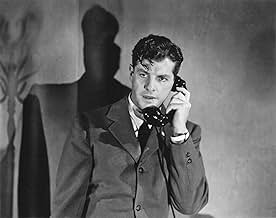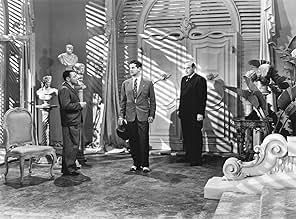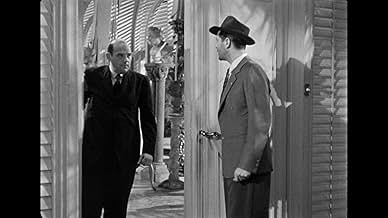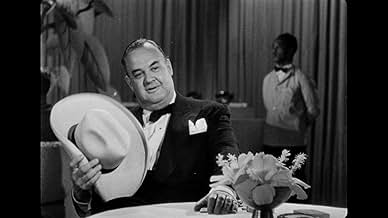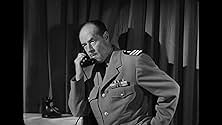Chuck Scott gets a job as chauffeur to tough guy Eddie Roman; but Chuck's involvement with Eddie's fearful wife becomes a nightmare.Chuck Scott gets a job as chauffeur to tough guy Eddie Roman; but Chuck's involvement with Eddie's fearful wife becomes a nightmare.Chuck Scott gets a job as chauffeur to tough guy Eddie Roman; but Chuck's involvement with Eddie's fearful wife becomes a nightmare.
- Director
- Writers
- Stars
- Awards
- 1 nomination total
Michèle Morgan
- Lorna Roman
- (as Michele Morgan)
Nina Koshetz
- Madame Chin
- (as Nina Koschetz)
Florence Auer
- Miss Connors
- (uncredited)
Spencer Chan
- Customer Patron
- (uncredited)
Herbert Evans
- Havana Cafe Customer
- (uncredited)
Tom Ferrandini
- Nightclub Patron
- (uncredited)
Bess Flowers
- Nightclub Patron
- (uncredited)
- Director
- Writers
- All cast & crew
- Production, box office & more at IMDbPro
Featured reviews
This is an exciting film noir with good performances & a tough script by Woolrich (anytime you see his name associated with a movie, it's a sign of quality, even for low budget series like Robert Dix's "The Whistler"). Robert Cummings gives one of the best performances of his life, because he avoids all those "Love That Bob" clichés he used to do so well (but sometimes, so inappropriately). Steve Cochran is very menacing & very sick as a sadistic mobster who wants to control everyone & everything around him (wait til you see his car, it's really neat!). Peter Lorre is prime Lorre, in a menacing role as Cochran's henchman. Michele Morgan is suitable as Cochran's sultry wife. The plot is not new, we've seen it before (& after), about an unhappily married wife who uses a friend to escape her husband. But the story's done in an interesting way, with some unusual aspects to it. There's plenty of shadows & lots of the movie takes place at night. The Chase moves at fast pace for the first 50 minutes or so, then slows down to catch it's breath, & then speeds up again near the end. I rate it 8/10.
A troubled ex-serviceman gets a job with a crime boss and his disturbed wife.
A 'find' for me and perhaps for other fans of noir. The 80-minutes are a perfect blend of dark visuals and surreal story. Frankly, when I think noir, I don't think Bob Cummings, an excellent light comedy actor, but hardly a figure of depth. But here, he essays the role of the troubled vet in subtle and persuasive ways. The nightclub scenes in Havana are particularly revealing, as the chaotic gaiety swirls around Scott (Cummings) and his spacey lover Lorna (Morgan)—a perfect metaphor for their circumstance.
A number of touches make this a memorable film. Casting Lorre as Gino was a coup, since his quietly devilish imp casts a background shadow over the proceedings. That's significant because Cochran, the alleged crime boss, comes across as a rather charming fellow even if he's behind dark deeds. Then there's that scene in the wine cellar, unlike any I've seen, and shrewdly abbreviated to catch the imagination. Also, catch Lorna's cameo framing through the porthole with shadows rising and falling over her face, as her nature itself migrates between light and dark. Add to the mix a speeding locomotive as the hand of fate, and a weirdly backseat driver that really is a backseat driver, and you've got an appropriately noirish race against time. And, of course, mustn't leave out the final scene so perfectly calibrated to end the film on a provocatively surreal note.
The movie's full of such imaginative twists and turns as penned by two of the best in the business, Woolrich and Yordan. I'm not sure why the movie's generally overlooked in the noir canon, perhaps because of Bob Cummings and his lightweight reputation, plus the lack of a true spider woman. Nonetheless, it's a provocative little gem, and one that prompts rare second thoughts long after the screen has gone dark.
A 'find' for me and perhaps for other fans of noir. The 80-minutes are a perfect blend of dark visuals and surreal story. Frankly, when I think noir, I don't think Bob Cummings, an excellent light comedy actor, but hardly a figure of depth. But here, he essays the role of the troubled vet in subtle and persuasive ways. The nightclub scenes in Havana are particularly revealing, as the chaotic gaiety swirls around Scott (Cummings) and his spacey lover Lorna (Morgan)—a perfect metaphor for their circumstance.
A number of touches make this a memorable film. Casting Lorre as Gino was a coup, since his quietly devilish imp casts a background shadow over the proceedings. That's significant because Cochran, the alleged crime boss, comes across as a rather charming fellow even if he's behind dark deeds. Then there's that scene in the wine cellar, unlike any I've seen, and shrewdly abbreviated to catch the imagination. Also, catch Lorna's cameo framing through the porthole with shadows rising and falling over her face, as her nature itself migrates between light and dark. Add to the mix a speeding locomotive as the hand of fate, and a weirdly backseat driver that really is a backseat driver, and you've got an appropriately noirish race against time. And, of course, mustn't leave out the final scene so perfectly calibrated to end the film on a provocatively surreal note.
The movie's full of such imaginative twists and turns as penned by two of the best in the business, Woolrich and Yordan. I'm not sure why the movie's generally overlooked in the noir canon, perhaps because of Bob Cummings and his lightweight reputation, plus the lack of a true spider woman. Nonetheless, it's a provocative little gem, and one that prompts rare second thoughts long after the screen has gone dark.
As a director Arthur Ripley only made six feature films but nothing in that short career quite prepares you for the gem that was "The Chase", which he made in 1946 and which Philip Yordan adapted from a Cornell Woolrich story. It's certainly bizarre, as down-on-his-luck Robert Cummings, (why Robert Cummings I keep asking myself), finds a wallet belonging to gangster Steve Cochran who, when he returns it, hires him as a chauffeur and that's when his troubles really begin, particularly when Cochran's frightened wife, Michele Morgan, asks him to help her get away from her husband.
Everything about this film is surprising and I just don't mean the plot. Cochran's a thug but he lives in a kitsch mansion filled with marble statues and he likes to listen to classical music while Cumming's a veteran who is also a dab hand on the piano. Perhaps the biggest surprise is just how good both these actors are. Being a gangster Cochran naturally has to have a henchman and as always Peter Lorre is superb in the part. About midway through you might start to get an idea in which direction this very strange movie is going and you may even be right...but on the other hand. Needless to say, "The Chase" has all but disappeared but if any film deserves cult status this is it. Unmissable.
Everything about this film is surprising and I just don't mean the plot. Cochran's a thug but he lives in a kitsch mansion filled with marble statues and he likes to listen to classical music while Cumming's a veteran who is also a dab hand on the piano. Perhaps the biggest surprise is just how good both these actors are. Being a gangster Cochran naturally has to have a henchman and as always Peter Lorre is superb in the part. About midway through you might start to get an idea in which direction this very strange movie is going and you may even be right...but on the other hand. Needless to say, "The Chase" has all but disappeared but if any film deserves cult status this is it. Unmissable.
In just the first scene the noir schmuck, an ex-GI back from the war, is wistfully looking at a man frying bacon behind a shopwindow, looks down, where —lo— in a sardonic twist of noir fate, he discovers a wallet full of money. Being a straight-up guy, he shows up at the mobster's place in Miami to return it, where he's promptly hired as a driver, falls for the unhappy wife, and elopes with her to Havana, the place of desire.
It's a dreamy setup worthy of the most profound noir, but the movie outright fails — the acting is stiff, the romance is forced, the pace is lethargic, the camera is uninteresting. We simply have second- grade talent doing poverty row work for a quick pay.
But even botched Woolrich is something, and this one's just so bizarre.
The narrator, our GI schmuck, suffers such intense anxiety (possibly related to the war, as often in noir). Midway through the narration breaks down and re-arranges the world. This is preceded by his very own death following a very murky chase through Havana, another deeply noirish twist. Anyway, it turns out that he was never in Havana, though he has the two tickets in his pocket.
We have obvious hallucination but the weirdest thing is as follows: 'when' the hallucination starts is undefinable and the ensuing 'real' story picks up from some point in it and culminates in another previously hallucinated moment in Havana. It's strange, because nothing is really done with it. But as clear explication of noir—as with Woolrich's Fear in the Night, almost too clear for my taste—this is straight to the point.
Noir Meter: 3/4
It's a dreamy setup worthy of the most profound noir, but the movie outright fails — the acting is stiff, the romance is forced, the pace is lethargic, the camera is uninteresting. We simply have second- grade talent doing poverty row work for a quick pay.
But even botched Woolrich is something, and this one's just so bizarre.
The narrator, our GI schmuck, suffers such intense anxiety (possibly related to the war, as often in noir). Midway through the narration breaks down and re-arranges the world. This is preceded by his very own death following a very murky chase through Havana, another deeply noirish twist. Anyway, it turns out that he was never in Havana, though he has the two tickets in his pocket.
We have obvious hallucination but the weirdest thing is as follows: 'when' the hallucination starts is undefinable and the ensuing 'real' story picks up from some point in it and culminates in another previously hallucinated moment in Havana. It's strange, because nothing is really done with it. But as clear explication of noir—as with Woolrich's Fear in the Night, almost too clear for my taste—this is straight to the point.
Noir Meter: 3/4
The first time I saw this film, I was mesmerised by the moody cinematography, the perfect casting of all the players and the unexpected twists and turns of the plot. Similar to the Noir classics, DOUBLE INDEMNITY and OUT OF THE PAST, the hero (Robert Cummings) is drawn into a web of intrigue by a beautiful woman (Michele Morgan), but in this case she turns out to be a legitimate "dream walking." The film was even better the second time around, as I could savour the various clues sprinkled throughout. Even by today's standards, Steve Cochran, Peter Lorre and their canine friend have to rank high among the screen's most vicious heavies. Vastly underrated, THE CHASE will set your heart a thumping! (According to the 2001 Maltin MOVIE & VIDEO GUIDE, it is now available on video)
Did you know
- TriviaUnderwent a restoration in 2012 by the UCLA Film & Television Archive.
- GoofsThe car speeds towards the oncoming train at 110 mph. The car's brakes are slammed on when it's about 30 feet from the track and then it skids to a stop within one or two car lengths. Defies physical law.
- Quotes
Eddie Roman: [after getting his lost wallet returned] How do you like that for an honest guy!
Gino: I don't... Silly, law-abiding jerk.
- Crazy creditsSteve Cochran (courtesy of Samuel Goldwyn)
- Alternate versionsThere is an Italian edition of this film on DVD, distributed by DNA srl, "SABBIE MOBILI (1950) + THE CHASE (Incatenata, 1946)" (2 Films on a single DVD), re-edited with the contribution of film historian Riccardo Cusin. This version is also available for streaming on some platforms.
- ConnectionsEdited into Terror in the Pharaoh's Tomb (2007)
- How long is The Chase?Powered by Alexa
Details
- Runtime
- 1h 26m(86 min)
- Color
- Aspect ratio
- 1.37 : 1
Contribute to this page
Suggest an edit or add missing content


